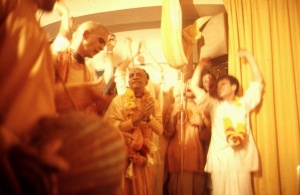SB 9.2.11-13: Difference between revisions
m (1 revision(s)) |
(Vanibot #0018 edit: make synonym terms in Sanskrit italic in SB - Vanisource) |
||
| Line 1: | Line 1: | ||
{{info | {{info | ||
|speaker= | |speaker=Śukadeva Gosvāmī | ||
|listener=King | |listener=King Parīkṣit | ||
}} | }} | ||
[[Category:Srimad-Bhagavatam - Canto 09 Chapter 02]] | |||
[[Category:Bhagavatam Verses Spoken by Sukadeva Gosvami - Vanisource|090211]] | |||
<div style="float:left">'''[[Srimad-Bhagavatam]] - [[SB 9|Ninth Canto]] - [[SB 9.2: The Dynasties of the Sons of Manu|Chapter 2: The Dynasties of the Sons of Manu]]'''</div> | |||
<div style="float:right">[[File:Go-previous.png|link=SB 9.2.10]] '''[[SB 9.2.10]] - [[SB 9.2.14]]''' [[File:Go-next.png|link=SB 9.2.14]]</div> | |||
{{RandomImage}} | |||
==== TEXTS 11-13 ==== | ==== TEXTS 11-13 ==== | ||
<div | <div class="verse"> | ||
vāsudeve bhagavati | :vāsudeve bhagavati | ||
sarvātmani pare 'male | :sarvātmani pare 'male | ||
ekāntitvaṁ gato bhaktyā | :ekāntitvaṁ gato bhaktyā | ||
sarva-bhūta-suhṛt samaḥ | :sarva-bhūta-suhṛt samaḥ | ||
vimukta-saṅgaḥ śāntātmā | |||
saṁyatākṣo 'parigrahaḥ | :vimukta-saṅgaḥ śāntātmā | ||
yad-ṛcchayopapannena | :saṁyatākṣo 'parigrahaḥ | ||
kalpayan vṛttim ātmanaḥ | :yad-ṛcchayopapannena | ||
ātmany ātmānam ādhāya | :kalpayan vṛttim ātmanaḥ | ||
jñāna-tṛptaḥ samāhitaḥ | |||
vicacāra mahīm etāṁ | :ātmany ātmānam ādhāya | ||
jaḍāndha-badhirākṛtiḥ | :jñāna-tṛptaḥ samāhitaḥ | ||
:vicacāra mahīm etāṁ | |||
:jaḍāndha-badhirākṛtiḥ | |||
</div> | </div> | ||
| Line 25: | Line 32: | ||
==== SYNONYMS ==== | ==== SYNONYMS ==== | ||
<div | <div class="synonyms"> | ||
''vāsudeve''—unto the Supreme Personality of Godhead; ''bhagavati''—unto the Lord; ''sarva-ātmani''—unto the Supersoul; ''pare''—unto the Transcendence; ''amale''—unto the Supreme Person, who is without material contamination; ''ekāntitvam''—rendering devotional service without diversion; ''gataḥ''—being situated in that position; ''bhaktyā''—because of pure devotion; ''sarva-bhūta-suhṛt samaḥ''—because of being a devotee, friendly and equal to everyone; ''vimukta-saṅgaḥ''—without material contamination; ''śānta-ātmā''—a peaceful attitude; ''saṁyata''—self-controlled; ''akṣaḥ''—the vision of whom; ''aparigrahaḥ''—without accepting any charity from anyone else; ''yat-ṛcchayā''—by the grace of the Lord; ''upapannena''—by whatever was available for bodily necessities; ''kalpayan''—in this way arranging; ''vṛttim''—the necessities of the body; ''ātmanaḥ''—for the benefit of the soul; ''ātmani''—within the mind; ''ātmānam''—the Supreme Soul, the Personality of Godhead; ''ādhāya''—keeping always; ''jñāna-tṛptaḥ''—fully satisfied in transcendental knowledge; ''samāhitaḥ''—always in trance; ''vicacāra''—traveled all over; ''mahīm''—the earth; ''etām''—this; ''jaḍa''—dumb; ''andha''—blind; ''badhira''—deaf; ''ākṛtiḥ''—appearing as if. | |||
</div> | </div> | ||
| Line 32: | Line 39: | ||
==== TRANSLATION ==== | ==== TRANSLATION ==== | ||
<div | <div class="translation"> | ||
Thereafter, Pṛṣadhra gained relief from all responsibilities, became peaceful in mind, and established control over all his senses. Being unaffected by material conditions, being pleased with whatever was available by the grace of the Lord to maintain body and soul together, and being equal toward everyone, he gave full attention to the Supreme Personality of Godhead, Vāsudeva, who is the transcendental Supersoul, free from material contamination. Thus Pṛṣadhra, fully satisfied in pure knowledge, always keeping his mind on the Supreme Personality of Godhead, achieved pure devotional service to the Lord and began traveling all over the world, without affection for material activities, as if he were deaf, dumb and blind. | Thereafter, Pṛṣadhra gained relief from all responsibilities, became peaceful in mind, and established control over all his senses. Being unaffected by material conditions, being pleased with whatever was available by the grace of the Lord to maintain body and soul together, and being equal toward everyone, he gave full attention to the Supreme Personality of Godhead, Vāsudeva, who is the transcendental Supersoul, free from material contamination. Thus Pṛṣadhra, fully satisfied in pure knowledge, always keeping his mind on the Supreme Personality of Godhead, achieved pure devotional service to the Lord and began traveling all over the world, without affection for material activities, as if he were deaf, dumb and blind. | ||
</div> | </div> | ||
__NOTOC__ | |||
<div style="float:right; clear:both;">[[File:Go-previous.png|link=SB 9.2.10]] '''[[SB 9.2.10]] - [[SB 9.2.14]]''' [[File:Go-next.png|link=SB 9.2.14]]</div> | |||
__NOTOC__ | |||
__NOEDITSECTION__ | |||
Revision as of 08:38, 1 December 2017

A.C. Bhaktivedanta Swami Prabhupada
TEXTS 11-13
- vāsudeve bhagavati
- sarvātmani pare 'male
- ekāntitvaṁ gato bhaktyā
- sarva-bhūta-suhṛt samaḥ
- vimukta-saṅgaḥ śāntātmā
- saṁyatākṣo 'parigrahaḥ
- yad-ṛcchayopapannena
- kalpayan vṛttim ātmanaḥ
- ātmany ātmānam ādhāya
- jñāna-tṛptaḥ samāhitaḥ
- vicacāra mahīm etāṁ
- jaḍāndha-badhirākṛtiḥ
SYNONYMS
vāsudeve—unto the Supreme Personality of Godhead; bhagavati—unto the Lord; sarva-ātmani—unto the Supersoul; pare—unto the Transcendence; amale—unto the Supreme Person, who is without material contamination; ekāntitvam—rendering devotional service without diversion; gataḥ—being situated in that position; bhaktyā—because of pure devotion; sarva-bhūta-suhṛt samaḥ—because of being a devotee, friendly and equal to everyone; vimukta-saṅgaḥ—without material contamination; śānta-ātmā—a peaceful attitude; saṁyata—self-controlled; akṣaḥ—the vision of whom; aparigrahaḥ—without accepting any charity from anyone else; yat-ṛcchayā—by the grace of the Lord; upapannena—by whatever was available for bodily necessities; kalpayan—in this way arranging; vṛttim—the necessities of the body; ātmanaḥ—for the benefit of the soul; ātmani—within the mind; ātmānam—the Supreme Soul, the Personality of Godhead; ādhāya—keeping always; jñāna-tṛptaḥ—fully satisfied in transcendental knowledge; samāhitaḥ—always in trance; vicacāra—traveled all over; mahīm—the earth; etām—this; jaḍa—dumb; andha—blind; badhira—deaf; ākṛtiḥ—appearing as if.
TRANSLATION
Thereafter, Pṛṣadhra gained relief from all responsibilities, became peaceful in mind, and established control over all his senses. Being unaffected by material conditions, being pleased with whatever was available by the grace of the Lord to maintain body and soul together, and being equal toward everyone, he gave full attention to the Supreme Personality of Godhead, Vāsudeva, who is the transcendental Supersoul, free from material contamination. Thus Pṛṣadhra, fully satisfied in pure knowledge, always keeping his mind on the Supreme Personality of Godhead, achieved pure devotional service to the Lord and began traveling all over the world, without affection for material activities, as if he were deaf, dumb and blind.